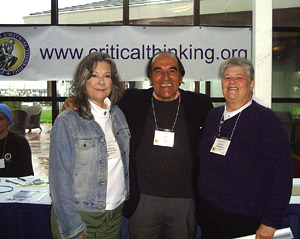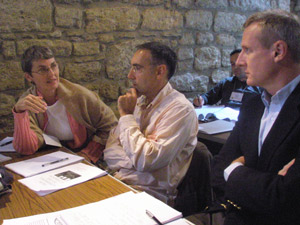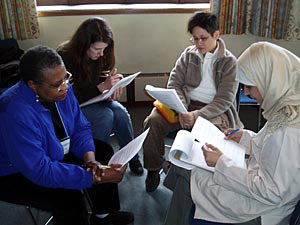How To Teach Students To Master Content
By Developing A Questioning Mind
 The quality of our lives is determined by the quality of our thinking. The quality of our thinking, in turn, is determined by the quality of our questions, for questions are the engine, the driving force behind thinking. Without questions, we have nothing to think about. Without essential questions, we often fail to focus our thinking on the significant and substantive.
The quality of our lives is determined by the quality of our thinking. The quality of our thinking, in turn, is determined by the quality of our questions, for questions are the engine, the driving force behind thinking. Without questions, we have nothing to think about. Without essential questions, we often fail to focus our thinking on the significant and substantive.
When we ask essential questions, we deal with what is necessary, relevant, and indispensable to a matter at hand. We recognize what is at the heart of the matter. Our thinking is grounded and disciplined. We are ready to learn. We are intellectually able to find our way about.
To be successful in life, one needs to ask important questions - when reading, writing, and speaking; when shopping, working, and parenting; when forming friendships, choosing life-partners, and interacting with the mass media and the Internet.
Yet few people are masters of the art of asking questions. Most have never thought about why some questions are crucial and others peripheral. Important questions are rarely studied in school. They are rarely modeled at home. Most people question according to their psychological associations. Their questions are haphazard and scattered.

Essential questions fall into a range of categories. Some essential questions are principally analytic, some principally evaluative. Some apply predominantly to academic subjects, others to our innermost thoughts, feelings, and desires.
Thinking within disciplines is driven, not by answers, but by essential questions. Had no basic questions been asked by those who laid the foundation for a field — for example, physics or biology — the field would not have been developed in the first place. Every intellectual field is born out of a cluster of essential questions that drive the mind to pursue particular facts and understandings. Biology was born when some humans pursued answers to the questions: “What are the characteristics of living systems? What structures exist in them? What functions do these structures serve?” Biochemistry was born when biologists began to ask questions such as: “What chemical processes underlie living things? How and why do chemical processes within living things interact and change?”

Every field stays alive only to the extent that fresh questions are generated and taken seriously as the driving force in thinking. When a field of study is no longer pursuing significant answers to essential questions, it dies as a field. To think through or rethink anything, one must ask the questions necessary to thinking through the logic of that thing, clearly and precisely.
In this conference we focus on questions as indispensable intellectual tools. We focus on a range of principles essential to formulating, analyzing, assessing, and settling primary questions.
The goal is to help students achieve a state of mind in which essential questions become second nature; these questions are the keys to productive thinking, deep learning, and effective living.
 The quality of our lives is determined by the quality of our thinking. The quality of our thinking, in turn, is determined by the quality of our questions, for questions are the engine, the driving force behind thinking. Without questions, we have nothing to think about. Without essential questions, we often fail to focus our thinking on the significant and substantive.
The quality of our lives is determined by the quality of our thinking. The quality of our thinking, in turn, is determined by the quality of our questions, for questions are the engine, the driving force behind thinking. Without questions, we have nothing to think about. Without essential questions, we often fail to focus our thinking on the significant and substantive. Essential questions fall into a range of categories. Some essential questions are principally analytic, some principally evaluative. Some apply predominantly to academic subjects, others to our innermost thoughts, feelings, and desires.
Essential questions fall into a range of categories. Some essential questions are principally analytic, some principally evaluative. Some apply predominantly to academic subjects, others to our innermost thoughts, feelings, and desires. Every field stays alive only to the extent that fresh questions are generated and taken seriously as the driving force in thinking. When a field of study is no longer pursuing significant answers to essential questions, it dies as a field. To think through or rethink anything, one must ask the questions necessary to thinking through the logic of that thing, clearly and precisely.
Every field stays alive only to the extent that fresh questions are generated and taken seriously as the driving force in thinking. When a field of study is no longer pursuing significant answers to essential questions, it dies as a field. To think through or rethink anything, one must ask the questions necessary to thinking through the logic of that thing, clearly and precisely.